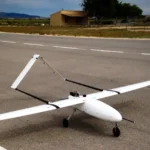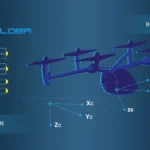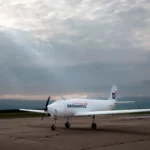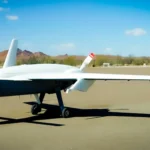The use of electric motors in aviation is no longer restricted to light small unmanned aircraft drones. Electric motors allow better autonomous control due to their short response time in comparison with combustion engines used in larger aircraft (commercial aviation, etc.). Furthermore, efficiency of electric engines is much higher than combustion ones (90% compared to values close to 30%). They also have a higher power-to-weight ratio, something very important to take into account in eVTOL applications.
Installation of electric brushless motors has associated specific electronics and components, being the batteries and motor controllers (ESC) the main ones. Its proper design is essential for the correct operation of eVTOL aircraft in order to ensure the maximum flight efficiency and the required robustness for Urban Air Mobility (UAM) operations.
Motor controller
An electronic speed controller (ESC), also known as motor controller, is an electronic component capable of regulating and controlling the rotational speed of an electric motor. In addition, it can also act as a dynamic brake as well as reversing the rotation sense. The most suitable ESC configuration for each application is determined by the type of electric motor it intends to control. In this sense, two main variants are distinguished:
Brushed Motor ESC
In this case, the speed is controlled by varying the voltage of the armature. They are cheap but less efficient.
Brushless Motor ESC
The operating principle is different, the speed variation is achieved by adjusting the time between pulses of current that is delivered to the different motor windings. These types of systems create three-phase AC current. These are the most popular for drone applications due to their great efficiency, power and lightness compared to the brushed ones. This is why Embention has focused on the development of this type of ESC for eVTOL applications, developing two high-power variants.
MC 280
This controller is designed for all types of applications where high power is required with a reduced voltage (12-75V), as it is capable of withstanding 280A real continuous current. It also has a regenerative brake, and is optimized both in size and weight, this being only 680 grams. In addition, it offers the possibility to install forced air cooling if the situation requires it. It has been designed to operate in harsh environments as it has an IP68 protection grade.
MC 25 KW
This model stands out mainly for the high power it is capable of controlling. The operating voltage covers a wide range between 100-550V. With a continuous motor current of 200A. Like its little brother, the MC 280, it is suitable to operate in humid environments (IP65) and also has the option of installing forced air cooling. The design stands out for having a reduced power / size ratio, with its maximum dimension being only 150 mm.

Both models are optimized for their integration in eVTOL, due to their reduced weight and size, the redundant control, the advanced telemetry and the compliance with the DO178C and DO254 aircraft standards required for eVTOL certification. However, their use is extrapolated to any system driven by electric motors that require high power such as light aircraft or professional drones.




